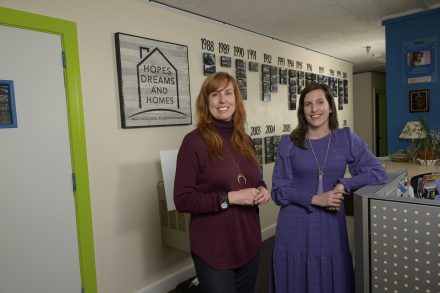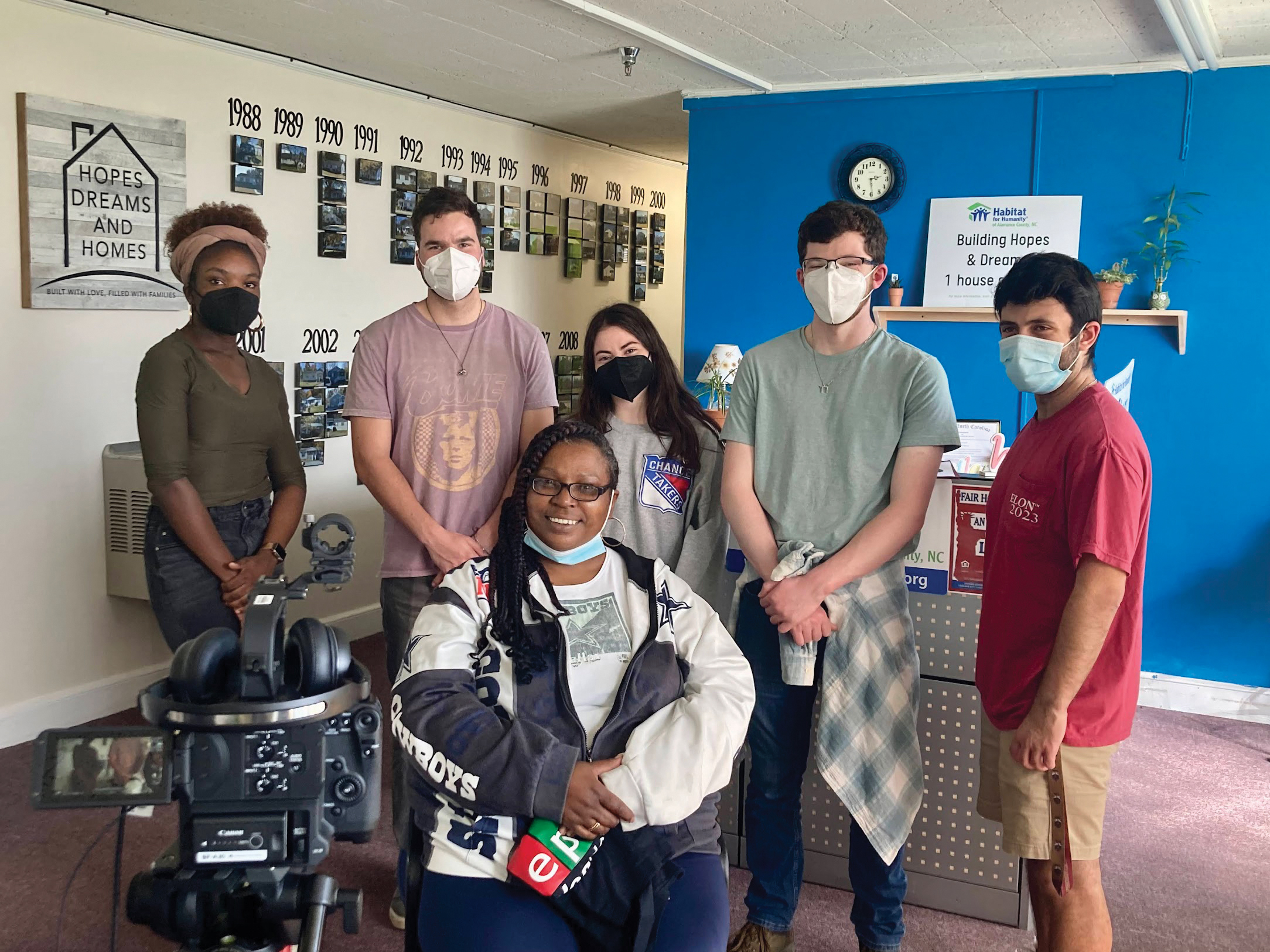elondocs, a yearlong student documentary film production program, puts the spotlight on Habitat for Humanity of Alamance County.
As last summer’s fundraiser for Habitat for Humanity of Alamance County drew to a close, Sarah Williams was strategic about how to conclude the charity event.
Throughout the “Family Feud”-themed soiree that attracted more than 300 attendees, the affiliate’s associate director had sprinkled in short video vignettes produced by members of elondocs, a yearlong program for School of Communications students interested in documentary film production. The objective of the videos was simple and two-fold: celebrate the nonprofit’s impact and highlight the housing needs in Alamance County. The fifth and final testimonial was the most powerful.
Donna McDonald’s two-minute video is emotionally raw right from its introduction. As the Habitat home recipient appears on screen, she immediately chokes up as she searches for the right words. “I’ve never, never said ‘homeowner,’” she explained as tears welled in her eyes. “I’ve never owned a home. I’ve never owned anything.”
McDonald then explained what homeownership has meant to her and her daughter, providing their family stability, security and peace of mind. The videos had the intended effect.
“We used these student-produced videos at our fundraiser to remind people of the impact of the work we do, and Donna was the closer,” Williams says. “She was so open with her story — and she was the one that brought out the Kleenex if you watched it. That video is the one that really pulls on the emotions.”
A ‘collaborative brainstorm’
As she sat last spring at one of the wooden picnic tables outside of Pandora’s Pies in downtown Elon, Williams did not know what to expect. But as her initial meeting with Nicole Triche, associate professor of cinema and television arts, and the elondocs cohort stretched on, her optimism grew.
There was a cooperative nature to the conversation between Williams, Triche and Elon students Brendan Antrosiglio ’23, Keiarra Bray ’23, Joey Gentile ’23, Leah Schultz ’23 and Ryan Gibbons ’25. “It felt like a collaborative brainstorm between all of us,” Williams says.
The early 2023 sit-down came on the heels of an out-of-the-blue email from Triche, offering Habitat what all nonprofits need: support. According to Triche, who has served since 2009 as elondocs’ faculty director, this was the first time an elondocs cohort decided to conduct a public service project. In years past, students usually spent the spring semester completing independent projects of their choice.

But Triche wanted to change course — and do some good. She brought forward the idea of a group project serving the community, and the students elected to take on the task together.
One nonprofit immediately came to Gibbons’ mind. His father serves as an executive director for a Tennessee affiliate in the suburbs of Knoxville, and he was familiar with the challenges many families face securing affordable housing.
“When I suggested that we work with the local Habitat affiliate, everyone was in full agreement,” says Gibbons, a double major in cinema and television arts and environmental and ecological science. “Habitat is just one of those organizations that I feel aims to accomplish a much-needed goal — affordable housing.”
Having previously worked in the university’s Kernodle Center for Civic Life, Williams is familiar with Elon, but she wasn’t aware of elondocs. And initially she had some trepidation. “I was intrigued when I heard that these were students who were not ‘voluntold’ to do it for an assignment,” she says. “Instead, they were interested in their own growth and service to the community.”
From that first brainstorming session, a semester-long partnership developed, resulting in five short videos detailing the affiliate’s history, the organization’s volunteers and, most importantly, the families impacted by the actions of their fellow Alamance County residents. The videos, which run one to two minutes in length, were first publicly shared at the affiliate’s June fundraiser, then distributed with end-of-year donation campaigns, and are now available on the organization’s YouTube channel.
The final videos have drawn rave reviews.
“The quality of the students’ work was beyond my wildest expectations,” Williams says. “I consider us really lucky because if we had to go out and hire someone to do this, it would have been thousands of dollars to get this quality of work.”
Supporting Elon’s community
With Williams’ support, the students conducted a series of interviews in the affiliate’s ReStore location in Burlington. The students’ professionalism, timeliness and pleasant nature stood out as they recorded homeowners and volunteers impacted by the organization’s mission.
Williams credits the students for eliciting emotional responses from the interviewees, asking questions with care, sensitivity and thought. Gibbons, then a sophomore, says the recording, interviewing and editing process was educational, and the mentorship he received from fellow students played a large role in his development.
The stories that we featured all depict the impact that affordable housing can have on everyone, whether it be a family, a community or the volunteers that make organizations like Habitat possible.
As for the final results, Gibbons says he sees real value from his cohort’s work, noting that media attention about poverty and helping those less fortunate often focuses on food, not shelter.
“I feel that these videos demonstrate the importance of providing housing opportunities,” he says. “The stories that we featured all depict the impact that affordable housing can have on everyone, whether it be a family, a community or the volunteers that make organizations like Habitat possible.”
Triche, too, sees the importance of Elon students becoming active community members in Alamance County, a place they call home for four years. “I’m so pleased we could partner with Habitat for Humanity because they do so much good for families in need,” she says. “And I am also glad that students are giving back to the community they are living in. The videos they produced are powerful and highlight the impact that Habitat is making on families with each home they build.”
This year’s elondocs cohort is expanding on the organization’s community outreach efforts, partnering with Benevolence Farm, a transitional living program for up to 10 women leaving North Carolina prisons. In collaboration with a Strategic Campaigns class led by Assistant Professor of Strategic Communications Sydney Nicolla, elondocs will provide video content promoting the program.



